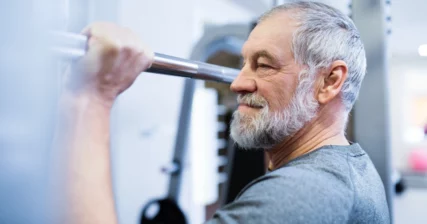Listen on: Apple Podcasts | Spotify
Clients and readers often ask if I’ll ever write a book about health and fitness. After more than 20 years, I have a lot I could write about. But then, I think about those who might read it.
Maybe it’ll be someone looking to get back in shape after years of eating poorly and avoiding exercise. Or, perhaps it’ll be someone who’s never really been fit. Then again, it could be a personal trainer or nutrition coach looking for additional ideas to share with clients.
After so much time teaching, training, researching, and writing, I’ve realized an important point about the idea of writing a health and fitness book:
The older I get, the more I try to simplify everything because in reality, getting fit and healthy is simple. Maybe not easy, but simple.
That’s not to say that as you get more fit, you won’t do things to fine-tune your diet or tweak your strength training program. But we’re in the midst of a crisis far more alarming than COVID-19 ever was, especially in the United States.
According to the National Center for Health Statistics, a whopping 70% of Americans are either overweight (32%) or obese (38%) compared to global averages of 39% and 13%, respectively. Put another way, the excess weight of Americans is equivalent to about 1 billion average human beings on the planet. By 2030, nearly half of the American population is projected to be obese.
Mauro F. Guillén, 2030: How Today’s Biggest Trends Will Collide and Reshape the Future of Everything
Rather than adding to the feeling of overwhelm so many people feel as they try to reclaim their health by writing another book on the topic, I prefer to keep things as simple as possible and as brief as possible.
After all, your efforts to improve your health and fitness should enhance your life, not become your life.
The following are seven simple principles to live by. In doing so, you’ll not only make better choices about your diet and lifestyle; you’ll also see through the nonsense portrayed by “health experts,” the government, and the advertisements trying to sell you something.
Don’t Lose Muscle
I often call this “The first rule of VIGOR Training,” my online fitness program. It’s the lens through which I consider all diet, nutrition, lifestyle, and medical choices.
Muscle is your quality of life investment account. The more you have when you reach old age, the longer you’ll be able to maintain your quality of life.
That’s no exaggeration. Muscle loss is often an avoidable consequence of:
- sedentary lifestyles
- low-calorie diets
- inadequate sleep
- excessive cardio
- a lack of strength training
- low-protein or plant-based diets
- low testosterone and high cortisol
- certain medications
Of course, the more muscle you build while you can, the better off you’ll be. But at some point in our lives, we all lose the ability to build muscle and must work to maintain it for as long as possible.
The good news is, you can keep building it well into your 50s and possibly 60s. And if you’ve never been consistent with building muscle, you can even increase muscle and bone density in your 70s and 80s.
More and more research even suggests that maintaining muscle has a greater impact on longevity than dropping body fat does, at least if you’re comparing someone with a little extra body fat compared to too little muscle.
By maintaining more muscle, you:
- Increase your resting metabolic rate
- Increase your capacity for storing carbohydrates
- Indirectly maintain greater bone density
- Support a stronger immune system
- Maintain greater strength, mobility, and joint integrity
Unfortunately, most people do things every day to compromise their muscle mass. Even many who think they’re doing something healthy end up losing muscle, like when they start eating less meat or following a low-calorie diet.
Don’t lose muscle!
Eat Your Calories
I once had a client drop 15 pounds in a month, simply by cutting alcohol. He drank beer each day, but mixed drinks can be just as bad when you add sugar-filled liquids to hard liquor.
Alcohol consumption disrupts sleep, can negatively affect testosterone levels, may increase cortisol, and worst of all weakens your decision-making power.
It isn’t just alcohol that leads to useless calorie consumption. Juice, soda, syrup in your coffee, and other liquid calories raise blood sugar, increase fat storage, and lead to wild fluctuations in energy levels.
As bad as liquid calories may be for adults, they can be even worse for kids. Fruit juice isn’t much better than soda, as it provides minimal nutrition and includes massive amounts of sugar. When kids consume sugary beverages at breakfast or lunch, it can compromise their ability to think and learn, which is especially problematic in school.
If you need a sweet beverage, drink a stevia-sweetened one, like Zevia. If you must have alcohol, drink hard liquor and add soda water or sugar-free soda. Yes, there are calories in hard liquor, but nowhere near as many as in most alcoholic beverage people drink. Even then, limit your alcohol if you’re serious about your health.
Protein First
When you eat, eat protein first.
Other than not drinking your calories, this simple hack has the most significant impact on your appetite, body composition, energy levels throughout the day, your ability to recover from exercise, and may even enhance the strength of your immune system.
First, high-quality protein like meat, eggs, cheese (if you tolerate it), poultry, and some fish, is highly satiating. When you eat it before eating the rest of the foods on your plate, you tend to eat less of the other foods.
Instead of restricting carbs, you choose not to eat them because you get full faster.
Second, by eating a large portion of protein first, you’ll likely increase your total protein intake for the day. High-protein diets have consistently outperformed low-carb or low-fat diets when it comes to health and fitness.
Third, when you eat more protein, you not only eat less other stuff during your meal, you’ll be less likely to eat a snack in the hours afterward.
All of this leads to fat loss, muscle gain, and improved overall health.
I encourage men to eat at least 40 grams of protein when eating a meal or snack and women to eat at least 30 grams. However, those who eat fewer meals during the day, such as those following an intermittent fasting pattern, usually eat much more with each meal.
You might find that you need to double, or even triple your protein intake, but if you do, and you eat it first, you’ll notice a big difference in your appetite for the rest of the stuff you eat. That said, if you still have an appetite, go ahead and eat the other foods. Over time, you’ll notice that you’ll eat less without thinking about it.
Handle Stress
Stress seemed to be overly vilified throughout much of the 2010s. Even today, you see articles suggesting that people need more “me time” and “self-care.”
In reality, we all need to learn to handle and adapt to stress, not run from it. Whether it’s physical stress like a strength training session, marriage stress, or work stress, the last thing we need to do is run and hide.
Instead, as we learn to handle stress and recover from it, we gain the strength to handle it even more. That’s how humans grow and get stronger. Avoiding it makes us weak and soft.
I’m stressing this point simply because I see so many health and fitness professionals recommend stress reduction as the solution for improving one’s health. An afternoon at the spa might feel like a relaxing escape, but the stress is still there, waiting for you to deal with it once the session is over.
Become more resilient to stress by handling it, not weaker by avoiding it.
Make Resistance Training Nonnegotiable
Wherever you are in the world, find a way to stress your muscular system beyond the way you stressed it last week. That’s what a good strength training program does.
Strength training triggers muscle growth and increased bone density, and it also teaches your brain to handle more significant stress.
This goes back to the point above. When you learn to overcome increasing levels of physical stress, you condition your mind to handle greater levels of mental stress as well.
The practice of training multiple times each week, no matter how you feel or where you are, makes you both physically and mentally stronger. Looking at the state of our nation, we need strong men and women today, more than ever.
Strong men (and women) make good times. Good times make weak men. Weak men make bad times. Bad times make strong men.
Maybe we needed to see the dysfunction in today’s society to gain an appreciation for the value of strong men and women.
Rely On Routines, Not Willpower
I can’t tell you how many times people have told me that they just needed more discipline to do what they knew they should do.
Willpower doesn’t work. Or, at least it doesn’t work for very long. In fact, the more we try to do what we don’t want to do or not do what we want to do, the weaker our willpower or discipline becomes.
It’s best if you set yourself up, so you don’t have to think about, act, or choose to do something you shouldn’t or not do something you should.
If you commit to showering at the gym before work, you’ll at least have to go to the gym to shower, and since you’re headed there, you’ll hopefully workout too.
If you always eat your protein first in a meal, you don’t have to restrict your carbs or fat until you get within 15-20 pounds of your ideal body composition.
If, at some point, you get on an intermittent fasting eating schedule, you won’t have to worry about eating a lousy breakfast of cereal, bagels, fruit juice, or other starch and sugar. You won’t eat breakfast, and so you won’t have to go through the mental turmoil of choosing to eat a healthy one or not.
Trust the Science, Not the Government
I’ll leave you with this final principle.
The government does not have your best interest in mind when it comes to your health. Nor, does it have your best interest in mind when it comes to much of anything else, but we won’t go there now. Let’s stick to health.
Ever since January 14, 1977, when George McGovern’s group published the first Dietary Guidelines for Americans, the government has been doling out poor nutrition advice and vilifying advice that works.
Instead of serving Americans’ waistlines, the dietary guidelines have served food industry companies’ bottom lines.
We were encouraged to fill our faces with carb-rich foods and reduce essential fats and protein in our diets. As time has gone by, it’s getting worse.
Today, we’re encouraged to eat less meat and even told we should skip it altogether once a week, if not go all-in on a vegan diet.
The effects of a meatless diet can show up in a small percentage of people pretty fast, just like a COVID-19 vaccine. But for most people, the results will take years or even decades.
As bad as the Dietary Guidelines were in 1977, I shudder to think what will happen to those who obediently follow along with a plant-based diet. They’ll think they’re doing something to protect themselves, and protect other by saving the planet. Yet, the science doesn’t back that up. Nutritional science shows that we need animal protein. We need high-quality fats.
We need science-based nutritional recommendations but don’t expect to get those recommendations from the U.S. government.

Feel Better Fast. Guaranteed.
Energy+, EDGE, and MentaBiotics make up the Happy Juice supplement stack, with ingredients clinically proven to:
- decrease anxiousness scores by 55%
- decrease irritability scores by 60%
- decrease fatigue by 64%
- decrease anger 54%
- decrease tension by 45%
- decrease confusion by 43%
- decrease overall distress by 49%
- increase good bacteria by 70%
- decrease negative mood by 105%
- increase positive mood by 211%
Photo by Farkas Mario on Unsplash



